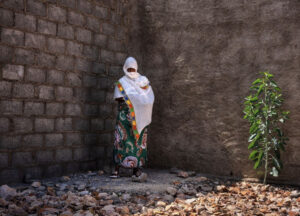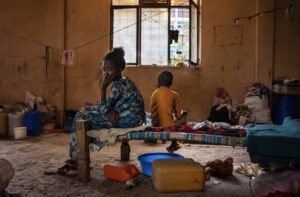We grieved together when Heaven Awot was killed by her mother’s landlord, Getnet Baye, in Bahir Dar, Amhara Region, Ethiopia, in August 2023. A seven-year-old, raped and murdered in a country that often treats violence against women as background noise.
After committing this heinous act, Getnet discarded Heaven’s small body, pressing sand into her mouth as if to erase her voice, to silence her protest forever. A year later, in August 2024, he was handed a 25-year sentence—a decision that ignited public outrage, as many demanded a harsher punishment. The case became the subject of explosive social media commentary, and, in a final twist, Getnet appealed his sentence.
We came to mourn after the sentencing, our collective grief fueled by renewed outrage over Heaven’s murder. As community members gathered for a public vigil to honor her memory and demand justice, the federal police arrived to silence us. “No permission,” they said, blocking any public grief or protest. And Heaven’s mother, the one who dared to demand justice, now moves from shadow to shadow, pursued by death threats. Her right to grieve and to heal—stolen by a system that punishes women simply for wanting to live.
How is it that demanding justice provokes more rage than the violence itself? Why, in Ethiopia, does the call for accountability cause such ferocious backlash? Why, as a society, do we fervently protect violence and its perpetrators while punishing those who resist? Why is this cruelty upheld as a noble cultural value?
Heaven’s murder wasn’t just a tragedy; it was a reminder. It’s systemic, a quiet epidemic that makes everyday life for women and girls a battle for survival. From the catcalls in the streets to the fists behind closed doors, to rape and murder—it’s all connected. And here’s the ugly truth: 35% of Ethiopian girls will experience sexual violence before they turn 18. That’s not a coincidence. That’s causality. One violent act feeds into another until violence becomes the air we breathe.

In Tigray and Amhara, where wars are “over,” violence against women thrives under a thin veil of “post-conflict” peace. Safety? It’s a lie. Over the last two years, survivors of wartime rape have returned to communities that mark them as outcasts—cut off from family, ignored by institutions, abandoned to heal in silence. We’re reminded, here in Ethiopia, how ethnic loyalties dictate who deserves empathy, with compassion rationed by bloodlines. Women’s bodies become the frontline of ethnic and political rage, where identity and power struggles are etched into flesh—even as the militias of our own countrymen assault our own women, marking them with the wounds of a nation divided against itself. These scars expose the role women are incessantly forced to play, bearing the weight of a nation’s fractured identity.
And as recent kidnappings of young girls in Tigray show, violence doesn’t need a battlefield—it thrives in the silence, in the dismissive glances, in a country eager to erase its wounds and call it peace. For these women, peace is a hollow word, their trauma buried as the cost of so-called “nation-building.”
Heaven Awot’s murder by her landlord cut deep. A seven-year-old, raped, strangled, her body dumped with sand in her mouth–a final, brutal act of silencing. Sand swallowed her voice, as if each grain were tasked with a job: to choke her cries, bury her truth, layer by layer, silence by silence. Sand, not as earth but as erasure, pressed there to ensure she’d never be heard—even in death. The outcry was deafening. The man responsible? Twenty-five years in prison. Just 25. And in this same country, people—mostly men—had the nerve to call for leniency. Sand to stifle her voice, leniency to stifle her justice.
Her mother pushed for her daughter’s case, fighting and protesting it into the public eye. “If our children can’t be safe in our homes, where else can we go?” she asked, speaking for all of us. For every woman who’s ever feared the stranger on the street or the man in her own home.
In Ethiopia, it’s always the women who bear the brunt. Of every crisis. Every conflict. IMF-imposed austerity policies. Climate disaster. During COVID-19, women were trapped in homes with abusers, cut off from support systems, as if the world itself conspired against them. Domestic violence spiked, and women became the shock absorbers of society’s pain, expected to neutralize the anguish around them and restore a false sense of equilibrium.
In Tigray, women’s bodies became the battleground. The Ethiopian and Eritrean national armies, along with regional forces and militias allied to all parties in the war, used sexual violence as a weapon to dismantle communities—destroy the women, destroy the people. It’s a tactic as old as war itself, and Ethiopia is living proof.
And what takes priority? Beautification. Billions of trees planted under the “Green Legacy“ banner, turning landscapes into a polished facade. Streets gleam with new lights, bike lanes, gated parks signal a nation’s progress. But these vanity projects offer no refuge. Trees are protected with fines and stringent regulations—yet where is the protection for the women and children walking those very streets?

Ethiopia’s refusal to confront this violence isn’t a lapse; it’s by design. It’s threaded through the very fabric of our society, reinforced in every institution, every ignored outcry, every unchallenged assault. Proverbs like “Sayt ina ahya dula yewedal”—“Women and donkeys love to be beaten”—aren’t relics of the past. They’re still spoken today. They are tools of control, reinforcing the idea that women are property, that they are made to be beaten, silenced, discarded.
Women have always been the invisible architects of peace in Ethiopia—holding families together, sustaining communities, stepping in to mediate where others won’t. But we’re shut out from every seat of real power, unable to shape the policies that impact us all, sidelined by the very structures we uphold. And this exclusion? It doesn’t just harm women; it unravels the nation, fueling cycles of violence and instability that bind us all. Women’s perspectives are more than vital—they’re a lifeline, carrying the experiences of families, communities, and the marginalized, grounding decisions in the full reality of our lives. Without women at the table, Ethiopia stays locked in a relentless loop of crisis and suffering. Rinse and repeat.
Violence against women isn’t isolated—it’s a continuum. Street harassment, domestic violence, wartime sexual assault—they’re all symptoms of the same disease. And we need to start treating this as a public health crisis, not as an inevitable inconvenience confined to the private corners of daily life. To address this, we need real infrastructure—solid, dependable systems that don’t rely on the goodwill of charities or the kindness of individuals. Survivors deserve more than piecemeal support; they need immediate, comprehensive, state-backed services that make safety and justice a right, not a favor. One-stop centers should provide a full spectrum of support—justice, healthcare, and psychological aid—all under one roof.
Only by confronting the continuum of violence and demanding accountability at every level can we begin to dismantle the systems of oppression that have allowed violence to become so ubiquitous, so normalized, that we scarcely recognize it as violence at all.
Bemnet Agata is a Pan-African feminist, advocacy professional, and researcher on gender justice, human rights, and development. She holds an MSc in Human Rights and Politics from the London School of Economics and Political Science and is currently based in Addis Ababa, Ethiopia.

Thank you for this impassioned plea to listen to the women of Ethiopia. I live in the US and we have so many Ethiopians living here but only male religious and other Ethiopian leaders. I’ve asked why and the women don’t seem to question it. Thanks for providing some much needed insights.